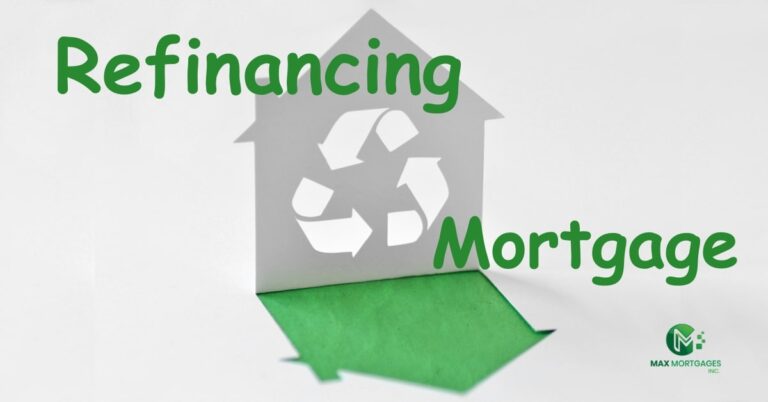Refinancing a commercial mortgage can be a thoughtful move for commercial property owners looking to improve cash flow, reduce interest rates, consolidate debt or access property’s equity. It can be a powerful tool for business owners.
If your current mortgage has terms that no longer suit your business (e.g., a variable interest rate), refinancing can help you switch to a more favorable fixed-rate loan.
Refinancing can extend the term of your loan, reducing monthly payments and freeing up cash flow for other business needs.
In this blog, we explore the ideal timing for refinancing, key considerations, and step-by-step guidance on how to handle the refinancing process effectively.
What is Commercial Mortgage Refinancing?
Commercial mortgage refinancing involves replacing an existing commercial mortgage with a new one, often with different terms.
It’s a financial strategy that business owners use to restructure their debt, usually to obtain more favorable loan conditions.
This could include securing a lower interest rate, extending the loan term, accessing equity in the property, or adjusting the payment schedule to improve cash flow.
Refinancing a mortgage can be a beneficial move for businesses looking to optimize their financial situation, reduce costs, or fund new projects.
However, it requires careful consideration of the costs involved, such as closing fees, prepayment penalties, and the overall impact on the business’s financial health.
Benefits of Refinancing a Commercial Mortgage
Lower Interest Rates: Refinancing your commercial mortgage at a lower interest rate can significantly reduce your monthly payments, leading to substantial long-term savings on interest costs.
Improved Cash Flow: By extending the loan term or reducing the interest rate, refinancing can lower your monthly payment obligations, freeing up cash flow for other business investments or operational needs.
Access to Equity: If your commercial property has appreciated in value, refinancing allows you to access the equity built up in the property. This equity can be used for renovations, expansions, or other business opportunities.
Debt Consolidation: Refinancing provides the opportunity to consolidate multiple loans or debts into a single mortgage with one manageable payment, often at a lower interest rate. Debt consoildation can simplify financial management and reduce overall debt costs.
Better Loan Terms: If your current mortgage has unfavorable terms, such as a high interest rate or a variable rate that creates uncertainty, refinancing can offer more stable and favorable terms, like a fixed-rate mortgage.
Flexibility to Adjust Repayment Terms: Refinancing can allow you to renegotiate the terms of your loan, providing greater flexibility to match your business’s current financial situation and future goals.
When to Refinance a Commercial Mortgage
Analyzing Market Trends
Evaluating market conditions is important when deciding to refinance your commercial mortgage. Commercial mortgage Interest rates change due to various economic factors, and locking in a lower rate can lead to substantial savings.
By keeping an eye on market trends and financial indicators, you can better determine the most advantageous time to refinance.
Reviewing Your Business’s Financial Condition
When considering refinancing your commercial mortgage, it’s crucial to assess your business’s financial status. Lenders will closely review your financial statements, credit history, and property value to determine your eligibility for a new loan.
Ensure your business shows strong financial health by maintaining consistent revenue, manageable debt levels, and a solid credit score.
Loan Maturity and Prepayment Penalties
When considering commercial mortgage refinancing, it is very important to understand your loan’s maturity date and any associated prepayment penalties.
The loan maturity date is when the remaining balance of your mortgage is due in full. If you’re approaching this date, mortgage refinancing might offer a way to extend or adjust the terms of your loan.
Additionally, prepayment penalties are fees charged by lenders if you pay off your loan early, including through refinancing.
Property Value and Equity
When refinancing a commercial mortgage, assessing your property’s value and the equity you have built is crucial. The value of your property directly influences the terms of your new loan.
Higher property value can increase the amount of equity available to you, which can be accessed through refinancing. This equity can be used for various business needs, such as expansion or improvements.
Lenders will evaluate the current market value of your property and how much equity you have accumulated to determine the terms of your refinance.
Understanding these aspects will help you leverage your property’s value effectively and secure favorable refinancing terms.
How to Refinance a Commercial Mortgage
Refinancing a commercial mortgage involves several key steps –
1: Review Your Current Commercial Mortgage
Begin by reviewing the terms of your existing mortgage, including interest rates, loan maturity, and any prepayment penalties. This will help you understand what changes you might be making and the cost involved.
2: Determining Your Refinancing Goals
When refinancing a commercial mortgage, it’s essential to clearly define what you hope to accomplish.Consider your specific business needs and objectives for refinance a commercial mortgage.
Identifying your refinancing goals will help you choose the best mortgage terms and align them with your business’s financial strategy
3: Research Lenders and Loan Options
Identify potential lenders, including traditional banks, commercial mortgage brokers, credit unions, online lenders, and specialized commercial lenders. Compare various loan products by evaluating interest rates, loan terms, fees, and the loan-to-value (LTV) ratio.
Fixed and variable interest rates each have their advantages, and the terms should align with your financial goals. Pay close attention to any associated fees, such as origination, appraisal, and closing costs, as well as the maximum LTV ratio, which affects how much you can borrow relative to your property’s value.
4: Gather Necessary Documentation
Gathering the necessary documentation for refinancing a commercial mortgage is one of the most important steps in the application process.
Properly preparing and organizing these documents can help streamline the process and improve your chance of securing favorable terms.
5: Submit Your Applications
After selecting the lenders and assembling the required documents, you can submit your refinancing application. Application submission is streamlined and easy for commercial mortgages.
Look forward to a thorough evaluation by the lender, who will meticulously review your financial health and assess the value of your property.
6: Review and Compare Offers
When you refinance a commercial mortgage, it’s essential to carefully review and compare the offers from different lenders to make the best decision. Evaluate the flexibility of each loan offer, including options for early repayment or modifications if your business needs change.
Review any covenants or requirements, such as maintaining specific financial ratios or providing regular financial reports.
7: Finalize the Refinancing Agreement
First, thoroughly review the final agreement to ensure that all terms and conditions align with what was negotiated. Address variations with the lender and make necessary adjustments.
Complete and submit any additional required documentation accurately. Once everything is in order, sign the agreement to commit to the new terms. Coordinate with the lender to schedule and attend the loan closing, paying any applicable closing costs.
Conclusion
This blog provides a thorough overview of the refinancing process, offering practical steps and key considerations to help you make informed decisions. Start the process, negotiate terms with lenders, and be aware of potential pitfalls like hidden fees and prepayment penalties.
By understanding the refinancing process and working with knowledgeable mortgage brokers like Max Mortgages in Ontario, Canada you can handle this complex refinance process easily with confidence.

Leena Sohal, a Principal Broker, brings over 20 years of mortgage industry experience to her role as a licensed mortgage broker for the past 15 years. Starting her career with industry giants TD and CIBC, Leena established a foundation based on integrity and professionalism. As the driving force behind Max Mortgages, she is dedicated to simplifying the mortgage process for clients, offering personalized service in the ever-changing housing market.
Under her leadership, Max Mortgages, a local independent business in the Greater Toronto Area, has earned commendations for exceptional customer service, embodying a commitment to genuine assistance and lasting client relationships.
FSRA Lic. # M09000197




